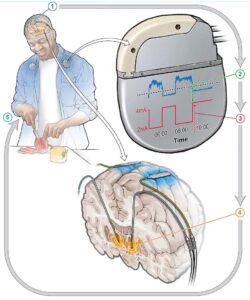The Alzheimer’s Association Clinical Meaningfulness Workgroup has developed recommendations and suggested language to help healthcare providers explain newly approved Alzheimer’s treatments to patients and caregivers.
“Benefits and Risks of FDA-Approved Amyloid-Targeting Antibodies for Treatment of Early Alzheimer’s Disease: Navigating Clinician-Patient Engagement” was published online today by Alzheimer’s & Dementia: The Journal of the Alzheimer’s Association.
The paper focuses on FDA-approved amyloid-targeting antibody therapies for early Alzheimer’s disease, which offer hope by slowing disease progression. However, these treatments are not cures, and thoughtful management — including ongoing, clear, factual communication — is required.
“The language and guidance in the article emphasizes the need for clear and empathetic communication between clinicians, patients and caregivers regarding treatment eligibility, risks, benefits and costs,” said Maria C. Carrillo, Ph.D., Alzheimer’s Association chief science officer and medical affairs lead, and senior author on the journal article. “It also stresses the importance of genetic testing in advance, ongoing monitoring for side effects, and managing the logistical and financial issues associated with treatment.”
“This effort was catalyzed by Alzheimer’s patients and families sharing their enthusiasm, but also their concerns — telling us what they want and need to know about these drugs, and the confusion and discord they’ve experienced because of the contentious public discussion about the FDA-approved treatments for early Alzheimer’s,” Carrillo said. “The issues are complex, but can be discussed in a way that everyone can understand. We do this for cancer treatment. We can do this for Alzheimer’s.”
The guidance outlined in the paper focuses on balancing hope with realism, discussing potential risks including amyloid-related imaging abnormalities (ARIA), and personalizing care plans.
The Workgroup’s recommendations include:
- Balanced, Accurate Communication: Clearly communicate the potential benefits and risks. Balance optimism with realism; ensure patients and caregivers understand that these treatments can slow disease progression but are not cures.
- Eligibility and Personalization: Tailor discussions about treatment eligibility based on disease stage, overall health, and genetic markers. Personalize care plans to align with each patient’s goals and circumstances.
- Informed Consent and Risks: Thoroughly explain potential side effects, particularly ARIA. Discuss how these risks will be managed throughout treatment.
- APOE Genotyping: Encourage APOE genetic testing for patients considering these therapies. It can provide important information about risk profiles, particularly ARIA./
- Ongoing Monitoring and Safety: Highlight the necessity of ongoing monitoring, including imaging and clinical evaluations to detect and manage side effects.
- Financial and Logistical Considerations: These include costs, insurance, and the travel and time commitment required for clinic visits, treatment infusions and monitoring.
- Support for Caregivers: Engage with caregivers as key partners in care. Provide them with resources and information about managing the disease, treatment logistics, and their role in monitoring for side effects or changes in the patient’s condition.
- Holistic Care Approach: Encourage an approach that goes beyond amyloid-targeting therapies, incorporating lifestyle, support for mental health, and the emotional and psychological needs of both patients and caregivers.
The Workgroup was formed in 2022 as part of the Association’s efforts to provide resources for clinicians about the benefits and risks of FDA-approved amyloid-targeting therapies for Alzheimer’s. It brought together experts in dementia care, academia, drug development and the clinical community. The Workgroup received input from experienced clinicians outside the academic and industry communities and the Alzheimer’s Association Early-Stage Advisory Group, which includes individuals with early-stage Alzheimer’s or mild cognitive impairment, to incorporate patient perspectives.
“As new Alzheimer’s therapies are approved, there may be different risks and expectations. Our goal is to update this resource to facilitate those discussions, as needed,” said Dorene M. Rentz, Psy.D., Professor of Neurology, Harvard Medical School and lead author of the paper.
“The Alzheimer’s Association is committed to providing dementia professionals with guidance to tackle challenges in the fight against Alzheimer’s,” Carrillo said.
About the Alzheimer’s Association
The Alzheimer’s Association is a worldwide voluntary health organization dedicated to Alzheimer’s care, support and research. Our mission is to lead the way to end Alzheimer’s and all other dementia — by accelerating global research, driving risk reduction and early detection, and maximizing quality care and support. Our vision is a world without Alzheimer’s and all other dementia®. Visit alz.org or call 800.272.3900.













Post Comment